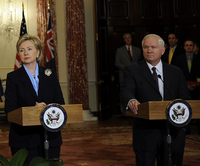These are nerve-racking times at the Pentagon. For "Big War" adherents, Iraq is not looking like the "one off" that many hoped it would be, as Afghanistan-Pakistan appears to be, if anything, an even harder slog. None of the dominant Big War scenarios are looking good, now that Iran is ever closer to nuclear deterrence, North Korea ever closer to collapse, and Taiwan ever closer to a peace deal with Beijing. Secretary of Defense Robert Gates, meanwhile, is locking in a more balanced take on small wars versus large, and the serious Leviathan budget-cutting has begun.
Clearly, a tipping point has been passed.
And yet there is a growing realization even among "Small War" advocates within "The Building" that this path is unsustainable. Adm. Mike Mullen, chairman of the Joint Chiefs of Staff, publicly admits with great frequency that the Defense Department will be stuck managing the U.S. government's nation-building portfolio for the next decade or so, but neither he nor Gates wants to see Defense as the primary source of "bucks and bodies." Yes, department capabilities must be built up over time, but the dream is for such authority to migrate to the other side of the Potomac River, to State.

